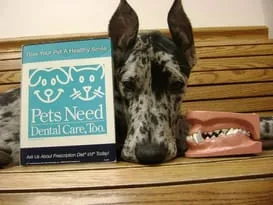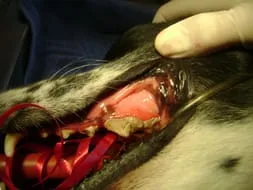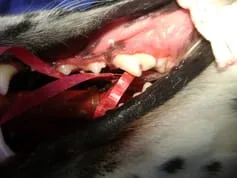Progressive Dental Care
The number one health problem diagnosed in 8 out of 10 cats and dogs over 4 years of age is periodontal disease. Many of your pet's dental problems involve the roots and other tissue which are not visible on a regular oral exam. Bacteria from oral infections have a clear path to the animal's bloodstream and vital organs. The organs with the highest blood flow are the most suseptible to infection. These include the lungs, heart, kidneys, liver, and even the brain. Dental care can add 2-4 years to the life of a pet and can truly be a fountain of youth.

While dental chews and mouth rinses are well meaning, the BEST way to prevent oral decay, is to brush your pet's teeth daily. Daily brushing prevents tartar and bacterial buildup in your pet's mouth. Be careful to ONLY use toothpaste designed for pets. This is important because some of the ingredients in the human toothpaste can be toxic to dogs and cats.
After tartar has adhered to the tooth, it is impossible to brush off. At this point, your pet needs to have his/her teeth professionally cleaned. We provide an extensive dental care program.To ensure the best results, pets are placed under anesthesia to avoid stress and to allow the doctors to clean all areas in the mouth, as well as perform oral surgeries and extractions when needed. Pets are continually monitored by a trained technician while under anesthesia.
Do not be discouraged if you have a senior pet, Lancaster Animal Clinic offers and recommends pre-anesthetic screening to all patients prior to undergoing an anesthetic procedure. This can eliminate certain concerns of the doctor and owner, while ensuring saftey of the pet.
All four doctors are experienced in performing routine dental cleanings, as well as oral surgeries when needed. To better serve you and your pet, Lancaster Animal Clinic also has the capability to perform dental x-rays, to achieve maximum success of the procedure.
Before Teeth Cleaning After Teeth Cleaning


6 Signs Your Pet May Have Periodontal Disease
1- Bad Breath
2- Red or swollen gums
3- A yellow-brown crust near the gum line
4- Loose or missing teeth
5- Discomfort when mouth or gums are touched
6- Possible decreased appetite or weight loss due to difficulty chewing
CALL OUR OFFICE TODAY IF YOUR PET IS DISPLAYING 1 OR MORE OF THESE SYMPTOMS

